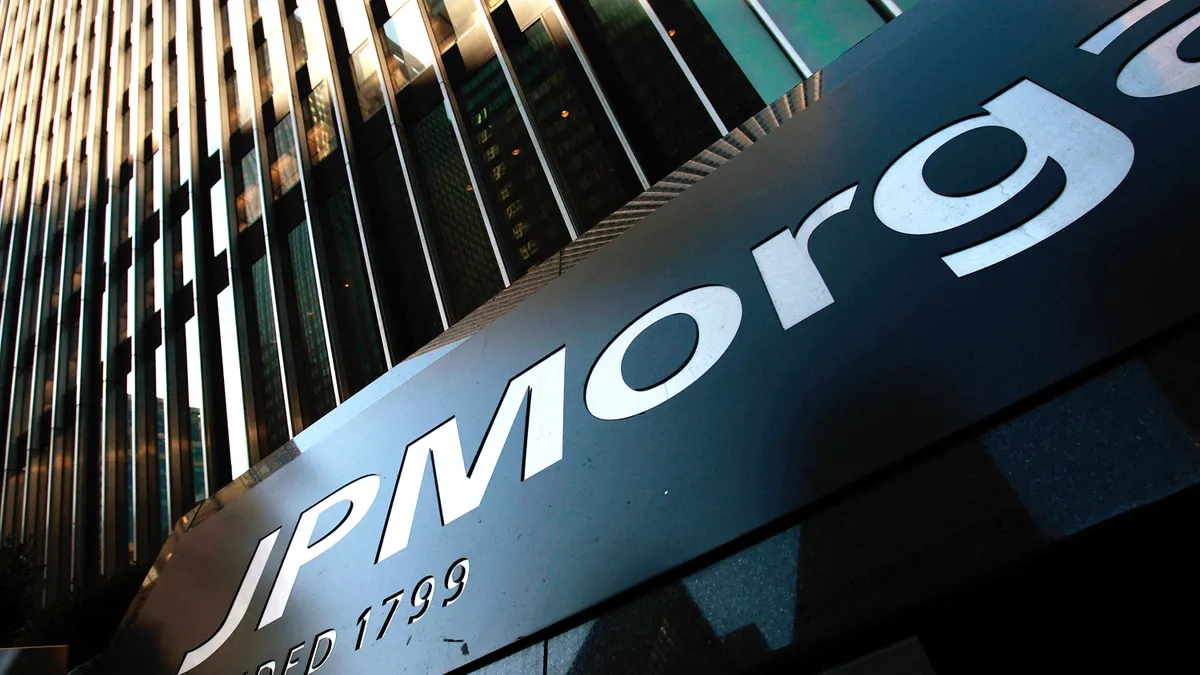Dive Brief:
-
JPMorgan Chase reported first-quarter profit of $14.3 billion Wednesday, up $11.4 billion from last year, boosted by a $5.2 billion release in its credit reserves.
-
The nation’s largest bank set aside $6.8 billion in Q1 last year in preparation for anticipated loan losses related to the coronavirus pandemic, as well as new accounting standards. In a statement, JPMorgan Chase CEO Jamie Dimon said the bank believes its current credit reserves of $26 billion are "appropriate and prudent, all things considered," while adding loan demand "remained challenged" as outstanding balances on cards remain lower even though spending recovered to pre-COVID levels.
-
The bank reported net revenue of $33 billion, compared to $29 billion in Q1 2020, while net interest income was $13 billion for the quarter, down 11% from the prior year.
Dive Insight:
JPMorgan Chase’s $5.2 billion release in loan loss provisions signals the New York-based bank is optimistic about the trajectory of the economy’s recovery from the pandemic.
"With all of the stimulus spending, potential infrastructure spending, continued Quantitative Easing, strong consumer and business balance sheets and euphoria around the potential end of the pandemic, we believe that the economy has the potential to have extremely robust, multi-year growth," Dimon said in a statement.
Should labor markets continue to recover and vaccine rollouts remain successful, the bank anticipates future reserve releases, JPMorgan Chase CFO Jennifer Piepszak told analysts Wednesday.
When asked by analysts about the bank’s acquisition strategy and its approach to potential fintech deals, Dimon said the bank’s doors are open to "anything that makes sense."
"We’re completely open-minded. It could be payments, it could be asset management, it could be data, it could be anything like that," said Dimon, who indicated in his annual shareholder letter last week that fintech acquisitions could be the best use of its capital rather than using it to buy back stock.
During the analyst call, Dimon teased several upcoming products and payments features the bank has in the works, including personalized apps, robo investing and global wallets, as the bank tries to keep pace with fintech innovations.
"Fintech has done a great job — they live under different constraints — but they've done a great job getting rid of pain points, making things automated, digitizing things and using the cloud. It's incumbent upon us to go fast to the cloud. We already have 150 major AI projects, but my guess is, in five years it'll be 1,000 AI projects," he said. "We're going as fast as we can to do a great job for customers, and obviously fintech will be a challenge."
Although Dimon lamented the "unfair" advantage of some fintech competitors, many of whom operate without bank charters and benefit from the ability to collect higher interchange fees under the Durbin Amendment, he stopped short of calling for more regulation of the sector.
"We're not wishing regulations on them like on us, I think that would be bad for America, but we are wishing for a level playing field around certain products or certain services," he said. "I, for one, think it’s grossly unfair that a neobank can have a small checking account and earn $200 in Durbin fees and we earn $100. That just isn't right. I can go on and on about some of the unfair things, but let the regulators do it. I'm not expecting any change, but we will just adjust our strategies accordingly."











